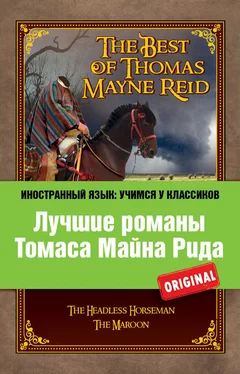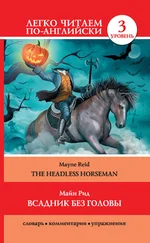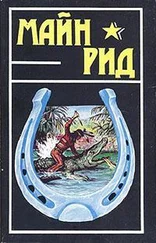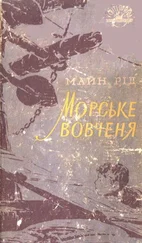“Your pardon,” replied the hunter. “I was struck with a resemblance between this poor fellow and one whom I know; but, Master Vaughan,” he continued, as if wishing to change the subject, “you have not said how you came to be all night in the woods? You were hunting yesterday and lost your way?”
“True, I lost my way, but not exactly while hunting.”
“Perhaps that is all the sort of breakfast you have had?” and the Maroon pointed to some pieces of the palm-cabbage that still lay on the turf.
“I have both supped and breakfasted upon it,” replied Herbert. “I had climbed the tree for water, when the boar came up to break his fast upon what remained of it.”
The Maroon smiled at this explanation of some circumstances by which even he had been mystified.
“Well,” said he, “if you are not anxious to return at once to Mount Welcome, and will give me five minutes’ time, I think I can provide you something better than raw cabbage.”
“I am not particularly in a hurry about getting back to Mount Welcome. Perhaps I may never go back!”
These words, combined with the air of the young Englishman as he uttered them, did not escape the notice of the intelligent Maroon.
“Something strange in this young man’s history!” said he to himself, though he had the delicacy not to demand an explanation of the ambiguous speech just made. “Well, it’s not my affair, I suppose!”
Then, addressing himself to Herbert, he said aloud —
“Do you agree, Master Vaughan, to eat a forest breakfast of my providing?”
“Indeed, with pleasure,” answered Herbert. “Then I must ring for my servants.” As he said this, the hunter raised his curved horn to his lips and blew a long, tremulous blast.
“That should procure us company and something to eat, master,” said he, allowing the horn to drop back to its place.
“Hark!” he continued, the instant after, “there are some of my fellows. I thought they could not be far off.”
As he spoke the sound of a horn was heard reverberating through the woods; and then another, and another – until nearly a dozen could be distinguished, yet all in different directions. They were evidently answers to the signal he had sounded.
“So, Master Vaughan,” he resumed, with an air expressive of triumph, though in a restrained and modest way, “you see these vultures would not have had it all their own way? My hawks were too near for that. Not the less am I beholden to you, Master Vaughan. I did not think it worth while to call my people. I knew the poltroons would not venture beyond a little swaggering talk. See! they come!”
“Who?”
“The Maroons!”
Herbert heard a rustling among the bushes on the opposite side of the glade; and, at the same time, about a dozen armed men emerged from the underwood, and advanced rapidly towards the ceiba .
Chapter 28
A Forest Breakfast
The young Englishman gazed upon the advancing troop with keen curiosity. There were about a dozen of them, all black men, or nearly all – only one or two of them showing any admixture of colour. There was not a dwarfish or deformed figure in the party. On the contrary, every man of them possessed a tall stalwart form, strong muscular limbs, a skin shining with health, and eyes sparkling with a vigorous brilliance that betokened an innate sense of freedom and independence.
Their erect, upright carriage and free, forward step confirmed the belief, which Herbert had already formed, that these black men were not bondsmen . There was nothing of the slave either in their looks or gestures. But for the colour of their skins, he would never have thought of associating such men with the idea of slavery. Armed as they were with long knives and guns, some of them with stout spears, they could not be slaves. Besides, their equipments told that they were hunters – and warriors, if need he. All of them had horns, with pouches suspended over their shoulders; and each was provided with a netted calabash for water, like that of the yellow hunter, already described.
A few carried an equipment altogether different – consisting of a small pannier of withe-work, or palm-fibre neatly woven. It rested upon the back, where it was held in place by a band of palm sinnet, crossing the breast, and another brought over the forehead, which thus sustained a portion of the weight. This pannier was the cutacoo – the depository of their provisions, and of such articles as were required in their wild forest rambles.
With regard to their costume, that was bizarre , though not unpicturesque. No two were dressed alike, though there was a certain idiosyncrasy in their attire, which proclaimed them all of one following. The toqued “bandanna [499] ” was the most common head-dress – a few having palm-leaf hats. Only some of them had a shirt with sleeves; others wanted a complete pair of trousers; and one or two were naked from the waist upward, and from the thighs downwards – the white cotton loin-cloth being the unique and only garment! All of them had their feet and ankles covered: as the stony and thorny paths they were accustomed to tread rendered necessary. The chaussure [500] was the same with all; and appeared to be a tight-fitting jack-boot, of some species of raw hide, without seam or stitching of any kind. The reddish bristles standing thinly over its surface, proclaimed the character of the material. It was the skin of the wild hog: the hind leg of a boar, drawn upon the foot while fresh and warm, as it dries tightening over the instep and ankle like an elastic stocking. A little trimming with the knife is all that is necessary for this ready-made mocassin; and once on, it is never taken off till the wearing of the sole renders necessary a refit. Drawing on his boots, therefore, is no part of the diurnal duties of a Jamaica hog-hunter.
I have said that Herbert Vaughan regarded the new comers with a feeling of curiosity as well as surprise. It was no wonder he did so. The mode in which they had been summoned into his presence, their echo-like answers to the horn signal, and their prompt, almost instantaneous appearance, formed a series of incidents that more resembled what might have been witnessed upon the stage of a theatre than in real life; and had the yellow hunter been a white man, and he and his followers clad in Lincoln green [501] , the young Englishman might have fancied himself in Sherwood Forest [502] , with bold Robin [503] redivivus [504] , and his merry men mustering around him!
“This white gentleman has not eaten breakfast,” said Cubina to his followers as they came up. “Well, Quaco! what have you got in your cutacoos?”
The individual thus appealed to was a jet-black negro of large dimensions, with a grave yet quizzical cast of countenance. He appeared to be a sort of lieutenant: perhaps the “Little John [505] ” of the party.
“Well, worthy capten,” answered he, saluting the yellow hunter with a somewhat awkward grace; “I believe there’s enough, one thing with another – that be, if the gen’lman has got a good appetite, and’s not too nice about what he eats.”
“What is there? Let me see!” interrupted Cubina, as he proceeded to inspect the panniers. “A ham of wild hog barbecued,” continued he, turning out the contents of a cutacoo. “Well, that to begin with – the white gentry are rather partial to our barbecued hog! What else? a brace of soldier-crabs. So far good. Ah! better still, a pair of ramier pigeons, and a wild guinea-fowl. Who carries the coffee and sugar?”
“Here, captain,” cried another of the cutacoo men, throwing his pannier to the ground, and drawing out several bags which contained the necessary materials for coffee-making.
“A fire, and be quick!” commanded Cubina.
Читать дальше
Конец ознакомительного отрывка
Купить книгу











